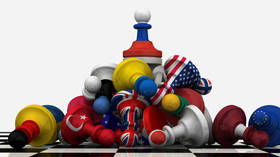What is Russia’s sanctions survival plan?
Moscow takes steps to stabilize domestic economy

The launch of the military operation in Ukraine has drawn the ire of the US and its allies, who have hit Russia with unprecedented sanctions in order to destabilize the country’s economy and pressure Moscow into ending the conflict. Among the many penalties imposed on the country over the past month, its financial system, energy exports, and forex reserves have been targeted. However, hard times call for prompt response measures, and Russia has come up with a few.
- National payment system Mir takes over for SWIFT
Major Russian banks have been cut off from the SWIFT global financial messaging system, effectively denying them access to international markets. However, Russia can now accept electronic transfers via Mir, the Russian alternative payment system, and work with foreign banks and businesses, bypassing Western restrictions. Mir also provides an alternative to Visa and MasterCard, which have stopped providing international transaction services to Russian clients. - Domestic currency trade and new export destinations
Sanctions also targeted Russia’s holdings in euros and US dollars to deny the country the ability to trade internationally. However, Moscow is setting up trade mechanisms to enable national currency payments with foreign trade partners. Russia and China have had ruble-yuan payment mechanisms for a while, and earlier this month, Turkey expressed its willingness to trade in rubles. Also, a ruble-rupee trading scheme has been announced for Russian oil exports to India. India, which until now bought only 3% of its oil imports from Russia, has been eager to boost purchases, as has Serbia. It is a sign that Russia has alternatives for exports if the West continues to isolate the country. - Exporters ordered to dump the dollar
In order to support the ruble, which has suffered a sharp decline against major currencies this month, Russian businesses that trade abroad have been ordered to sell 80% of their foreign currency earnings and convert them to rubles. It is expected to stabilize the national currency and encourage more investments in Russia instead of moving them abroad. - Grain export ban to secure domestic supplies
Russia has temporarily banned grain exports to the countries of the Eurasian Economic Union (EAEU) this week. Restrictions cover shipments to post-Soviet states that share a free customs zone with Russia. They include, Armenia, Belarus, Kazakhstan, and Kyrgyzstan. The measure aims to keep the domestic food market well stocked and prices from soaring. - Interest rate hike to support the national currency
With nearly half of the country’s forex reserves frozen and unavailable to support the depreciating ruble, the Russian Central Bank urgently raised the key rate late in February from 9.5 to a record 20% per annum. The step was taken to compensate for the increased devaluation and inflation risks, or simply to help maintain price stability and protect citizens’ savings from depreciation. The regulator also launched additional measures to support credit institutions and recommended that banks not charge interest and penalties on loans, as well as allowing the restructuring of payments and repayment holidays. The moves have helped to stabilize the ruble, which has recorded six consecutive days of gains against the euro and the dollar, as of Thursday. - Ruble debt payments to avoid default
Russia has authorized two payments to bondholders totaling $117 million due on Wednesday in US dollars. The money comes from the country’s accounts frozen abroad. It is now up to the US and its allies to approve the transfer. If they do not, the Russian government has ordered that the debt be paid in rubles at the official central bank exchange rate at the time of transfer. Western-based institutions insist that unless the debt is paid in the currency of issue, Russia faces its first default in a century. Moscow insists that the West is trying to engineer “an artificial default” since the country has the money to pay its debts, to which it is being denied access. - Targeted support for citizens
On Wednesday, President Vladimir Putin ordered new measures to support Russian citizens amid rising prices, unemployment, and supply issues tied to sanctions. The steps will focus on protecting families with children and elderly citizens. He said a decision to increase the minimum wage, salaries in the public sector, and social benefits, including pensions, will be made in a matter of days. - Financial support for entrepreneurs
The Russian government has approved a draft plan to support small and medium-sized businesses. Local authorities have been instructed to provide organizations, individual entrepreneurs, and self-employed citizens with support measures, including subsidies and credits. - Exporters advised to turn to domestic market
President Putin has urged Russian exporters not to reduce production in response to sanctions, but to supply the domestic market. This will keep prices within the country from surging, including for gasoline, diesel, metals, and other export goods, he said, adding that import substitution projects have never been more important. - Foreign businesses offered ways to stay in Russia
Facing sanctions pressure, a number of foreign companies this month announced their temporary withdrawal from Russia, including IKEA, Microsoft, Volkswagen, Apple, Shell, McDonald’s, H&M, and others. Proposals were made to nationalize these enterprises to keep the businesses running. However, in his address on Wednesday, President Putin said Russia will respect private ownership of foreign firms. Earlier, he voiced support of another idea – to introduce external management, so foreign firms could be run by partners in Russia. The Ministry of Economy is developing a bill to regulate the procedure.
For more stories on economy & finance visit RT's business section
You can share this story on social media:












